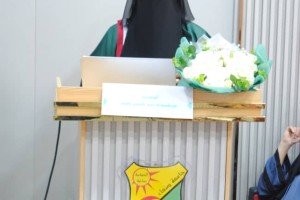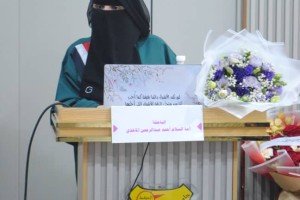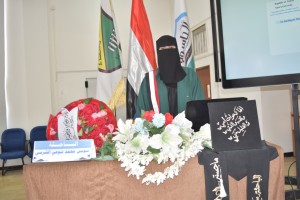Master’s Degree for Asmaa Abdulwali Ahmed Department of Quranic Studies, Faculty of Education
- Categories Letters and Promotions - Graduate Studies, news, Regulations - Postgraduate Studies
- Date March 27, 2025

Researcher Asma’a Abdulwali Ahmed Othman earned her Master’s degree with honors and a grade of 95% from the Department of Quranic Studies, Faculty of Education, Sana’a University. Her thesis entitled “Nafais Al-Jawaher Al-Hissan Al-Bahiyya fi Bayan Asrar Ma’ani Al-Ayat Al-Qur’aniyya” by Scholar Hassan bin Ibrahim Al-Khatib Al-Zubaidi Al-Yamani (From the beginning of Surah Al-Hijr to the end of Surah Al-Nahl – Study and Investigation) was held on Tuesday, 18 Ramadan 1446 AH, corresponding to March 18, 2025 AD.
The defense committee consisted of:
* Professor Dr. Refa’at Hussein Aborah, main supervisor and committee member, Sana’a University.
* Associate Professor Mujahid Yahya Muhammad Hadi, internal examiner and committee chairperson, Sana’a University.
* Assistant Professor Al-Junaid Al-Tayeb Amin Al-Nour, external examiner and committee member, Saada University.
The thesis aimed to:
* Introduce the Scholar Hassan bin Ibrahim Al-Khatib (d. 1265 AH) as a scholarly figure who served Quranic Interpretation.
* Introduce his book under study and highlight its importance and features.
* Explain the author’s approach in interpretation and his most important resources.
* Examine and analyze the manuscript from the beginning of Surah Al-Hijr to the end of Surah Al-Nahl, and study it with a modern methodology based on the suitable verified rules and regulations followed in the scientific investigation of manuscripts.
The thesis revealed a number of findings, including:
* The Scholar Al-Hassan Al-Khatib lived in the thirteenth century AH, which is considered the most famous era for science, knowledge, diligence, and renewal.
* The book “Nafais Al-Jawaher” is considered one of the most important books of interpretation, as its author combined interpretation from transmitted narrations and commendable opinions of interpreters. The scientific value of the book is evident in the insights and benefits it provides.
* The author interpreted the Quran via the Quran itself, the Sunnah of the Prophet, and the sayings of the Companions. He cited authentic Hadiths and some weak ones in his interpretation.
* The abundance of the author’s knowledge was evident in his rich discussions and in the use of Quranic verses as evidence in their appropriate places. Also, in the way he addressed the abrogating and abrogated verses, giving his opinion on some of them.
The researcher provided a number of recommendations in her thesis, including:
* The need to research and investigate the manuscripts of the Yemeni Islamic heritage in libraries, investigate them, and bring them to light by applying modern scientific methods.
* The need to activate communication and cooperation between Yemeni universities and Arab & Islamic universities interested in publishing and teaching the Yemeni heritage.
* Teaching the manuscript “Nafais Al-Jawaher” in the course-work preparatory year of the Master’s program because it contains many insights and subtleties.
The Viva discussion was attended by a number of academics, researchers, students, interested individuals, and a number of the researcher’s colleagues and family members.
Discover more from Sana'a University
Subscribe to get the latest posts sent to your email.
Previous post






